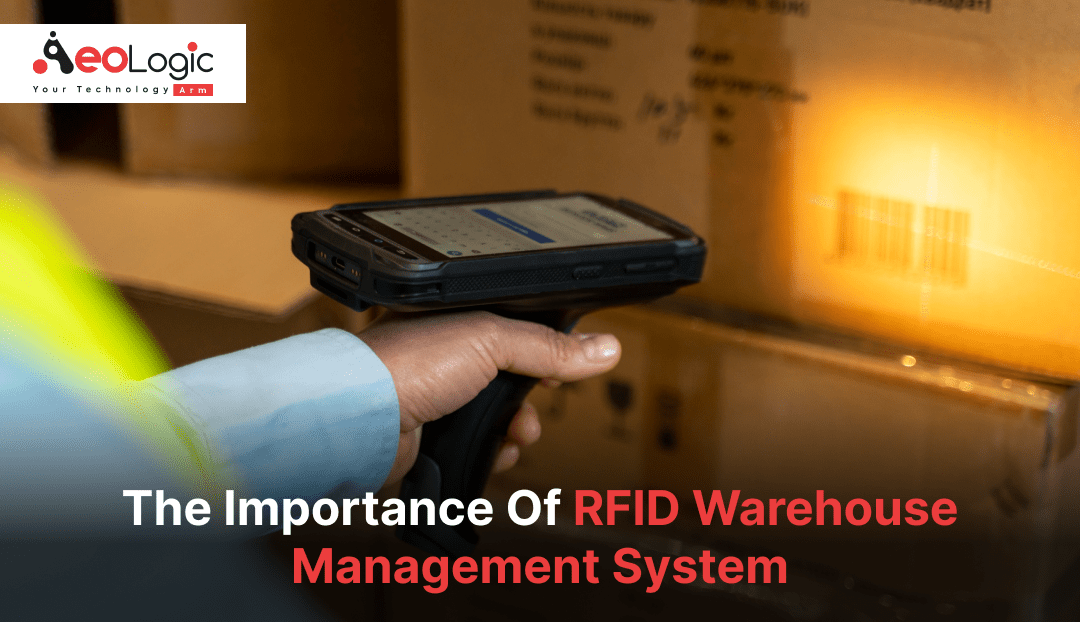Warehouse management is a crucial aspect of any business as it manages the whole product’s stocking. Generally, warehouse management refers to overseeing and optimizing a warehouse’s day-to-day operations such as inventory, orders, shipping, labor, space, etc. In this advanced and technology-affected world, many software manage warehouses more efficiently than conventional systems. By offering real-time inventory visibility, enhancing labor management, and strengthening ties with suppliers and customers, a warehouse management system (WMS) can assist with warehouse management. The global warehouse management system (WMS) market size is expected to be around $3.45 billion in 2024.
A warehouse management system is incredible, but many technologies can enhance it more than ever. RFID, or radio frequency identification, can be a technology that can improve various warehouse operations by integrating with warehouse management systems.
How RFID Solutions Are Transforming Warehouse Management?
Nowadays warehouse management systems rely heavily on RFID solutions because this technology can enhance real-time visibility, operating efficiency, and inventory accuracy. It speeds up inventory tracking, lowers human error, and automates tasks like order fulfillment and stock counting. RFID offers data-driven insights for improved decision-making, improves security by reducing theft and shrinkage, and interfaces easily with other systems like ERP and WMS. RFID is a crucial tool for effective warehouse operations since it improves customer satisfaction and asset utilization by streamlining processes, lowering stockouts, and guaranteeing on-time delivery.
The global market size for Radio Frequency Identification (RFID) technology in 2024 is estimated to be between $15.49 billion and $16.315.67 million. Where the global warehouse RFID market grew at a compound annual growth rate (CAGR) of 9% from 2019 to 2023, reaching a total revenue of $7,496.5 million. The market is expected to continue growing at a CAGR of 10.8% from 2024 to 2034.
In this article, we will see the importance of RFID warehouse management systems. We will also see some other details like pros, cons, etc. In the end, we will end the discussion with a concluding paragraph.
Also Read: Benefits of RFID- Why Do You Need RFID Solutions?
What is an RFID Warehouse Management System?
An RFID is generally a technology that works on radio frequency to track the products using tags. The tags generally attach to items that have unique identities to scan and get information. A Radio Frequency Identification (RFID) technology warehouse management system can track, manage, and maximize the flow of assets and inventory inside a warehouse.
RFID reduces human error and increases operational efficiency by automatically identifying and tracking tags affixed to objects using electromagnetic fields. This allows for real-time stock visibility. 
Benefits of RFID Warehouse Management System
RFID warehouse management systems have many benefits. Here a few key benefits are mentioned below.
Real-time tracking
Inventory tracking is important as this gives accurate data on what needs to be restocked in the inventory. RFID-based warehouse management system lowers the possibility of human mistakes and increase inventory accuracy by enabling automatic, real-time inventory tracking without the need for human participation.
Faster inventory management
Inventory management can also be enhanced with the RFID warehouse management system. There are a lot of types of products that take too much time to scan manually. Where RFID-based warehouse management systems expedite inventory counts, stock audits, and replenishment procedures by enabling the rapid, simultaneous scanning of multiple objects. This overall faster the operations for inventory management.
Related blog: RFID Asset Management Solutions for Your Operation
Enhances security and loss prevention
Security and loss prevention should be very strict within an organization that increases the cost efficiency and trust of customers. RFID-based warehouse management system allows for tracking of every product and reduces the chances of theft, mishandling, misplaced, etc. The RFID tags are also designed in such a way that can enable an alert alarm when any risk factor is detected.
Data-driven insights
Data plays an important role in extracting meaningful information as it enables us to provide proper insights. With the RFID warehouse management system, a multitude of real-time data can be produced by RFID ability, which can be examined to enhance inventory management tactics, spot trends, and enhance warehouse operations.
Automated process
There are many operations like stock checks that are repetitive and take a lot of time to manually do. Where with the RFID-based warehouse management system, automating inventory management procedures, frees up warehouse employees’ time to concentrate on higher-value activities by eliminating the need for manual stock inspections.
Also Read: Benefits of RFID Apparel Inventory Management System
Challenges with the Implementation of RFID Management Systems
We have seen a lot of benefits with RFID warehouse management systems but there could be some challenges too. Here are a few mentioned below.
-
- The initial cost of setting up RFID in the warehouse system can be a concern as it takes a lot of capital and many organizations are not able to afford it.
-
- Integration complexity can be another issue as integrating RFID with existing warehouse management software (WMS) and Enterprise Resource Planning (ERP) systems may require additional advancements.
-
- Signal interference can be another challenge as the network could easily be affected by any metal interference.
Also Read: Using RFID for Inventory Management: Pros and Cons
Final Words
With major benefits in terms of accuracy, efficiency, and cost savings, an RFID warehouse management system (WMS) is revolutionizing contemporary warehouse operations. RFID improves operational workflows, lowers human error, and guarantees more precise order fulfillment by automating procedures, enhancing asset usage, and offering real-time inventory tracking.
There could be some challenges while implementing RFID in a warehouse management system like integration, initial cost, interference, etc but by tackling these challenges, it is worth every penny. Overall, using RFID technology in warehouse management is becoming essential for companies trying to remain scalable and competitive in a logistics landscape that is becoming more complex.
Ready to transform your warehouse operations with RFID solutions? Connect with Aeologic Technologies today and let us help you streamline processes, reduce errors, and boost efficiency.






